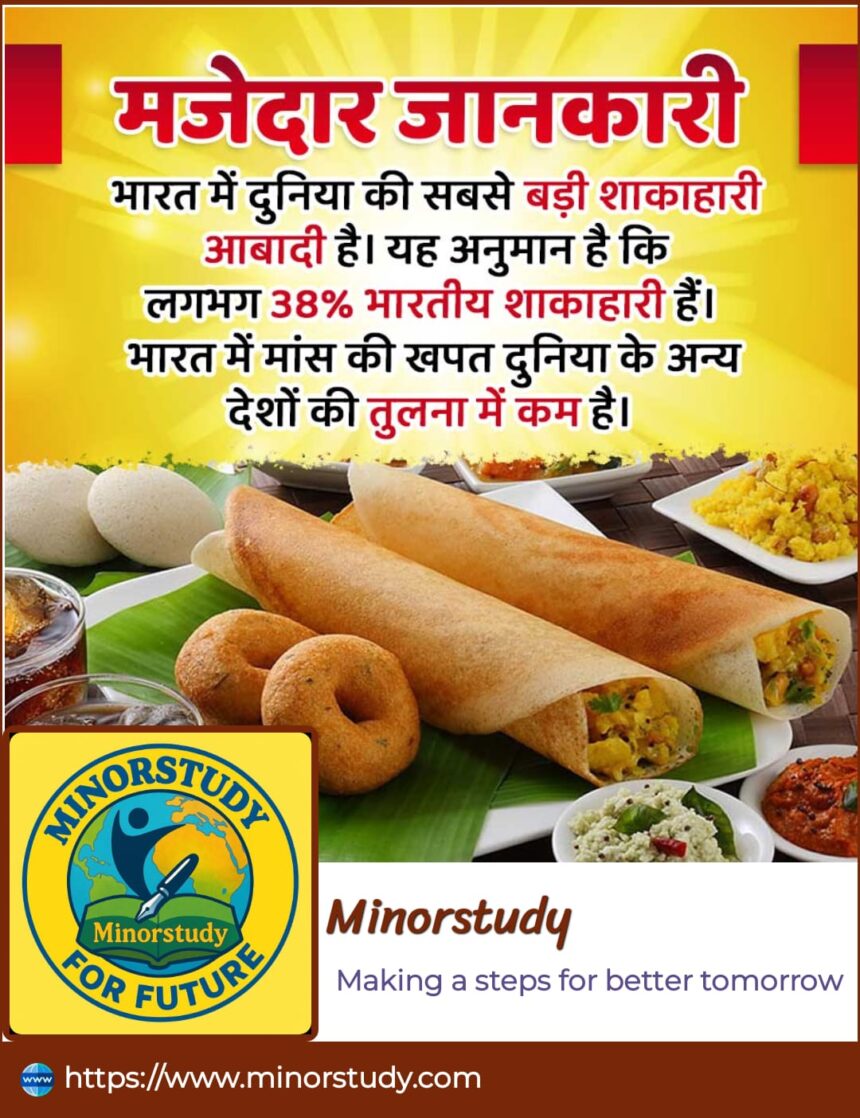🌱 11 Surprising Facts About India’s Vegetarian Culture – A Proud and Powerful Tradition
India is a land of profound traditions, philosophies, and spiritual depth. Among its many unique cultural traits, vegetarianism holds a special place. While vegetarianism is often associated with health and modern lifestyle choices in the West, in India, it’s a deeply rooted cultural, religious, and ethical practice.
Did you know that India has the largest vegetarian population in the world, and meat consumption here is far lower than in most nations? This isn’t just a diet — it’s a way of life.
Let’s take a human-friendly and detailed dive (with 1200+ words) into the history, facts, FAQs, significance, observance, important points, wishes, daily life impacts, and importance to society of India’s vegetarian tradition — with timelines, cultural insights, and positive messages you’ll love to know!
🕉️ History of Vegetarianism in India
🌾 Ancient Roots – Vedic Influence
The tradition of vegetarianism in India dates back thousands of years, with references in the Vedas, especially the Rigveda and Atharvaveda.
Ancient rishis and saints promoted Ahimsa (non-violence), which naturally extended to animals.
Brahmins, Jains, and Vaishnavites especially adopted a vegetarian lifestyle as a mark of purity and compassion.
🐘 Influence of Jainism and Buddhism
Jainism and Buddhism strengthened vegetarianism as an ethical choice, advocating for Ahimsa toward all living beings.
Jain diets are the most strict, avoiding even root vegetables to prevent harming microorganisms.
🇮🇳 Continuity into Modern India
Despite globalization and modern food trends, vegetarianism remains vibrant in India, especially in states like Rajasthan, Gujarat, Uttar Pradesh, and Maharashtra.
📆 Timeline of Key Events
| Year/Period | Event/Influence |
|---|---|
| ~1500 BCE | Vedic texts mention non-violence and ritual purity |
| ~600 BCE | Rise of Jainism and Buddhism promote ethical vegetarianism |
| 300 BCE – 300 CE | Tamil Sangam literature praises vegetarianism in spiritual context |
| 12th – 16th Century | Bhakti movement spiritual leaders preach simple and non-violent living |
| 20th Century | Gandhi Ji promotes vegetarianism as both moral and nationalistic choice |
| 2020s | India maintains world’s largest vegetarian population, over 400 million |
🧠 11 Surprising and Fun Facts About India’s Vegetarian Culture
World’s Largest Vegetarian Population
Over 38% of Indians are vegetarians, making India home to more vegetarians than any other country.Many Indians Are Flexitarians
Even among meat-eaters, many follow vegetarian diets on specific days like Mondays (for Lord Shiva) or Thursdays (for Guru).Vegetarianism is Legally Protected
In many Indian states, there are laws that protect vegetarian food labeling, and separate counters are maintained in schools and public places.Color-Coded Food Labels
India is one of the few countries where food packaging must display a green dot (vegetarian) or red dot (non-vegetarian).Strong Cultural Identity
For many Indian communities, being vegetarian is not just about food — it’s about identity, ritual purity, and ancestral values.Jainism: The Strictest Vegetarianism
Jains do not consume meat, fish, eggs, root vegetables, or even onions and garlic. They believe in absolute non-violence.Vegetarian Cuisine Diversity
Indian vegetarian cuisine is incredibly rich — from Gujarati thalis to South Indian dosas, Punjabi sabzis, and Kashmiri dum aloo.Spiritual Leaders Were Vegetarians
Great personalities like Mahatma Gandhi, Swami Vivekananda, Ramakrishna Paramahamsa, and many yogis emphasized sattvic (pure) food.Global Vegetarian Movements Inspired by India
Many international thinkers (e.g., Leo Tolstoy, Albert Einstein) were influenced by Indian vegetarian ethics.Cultural Vegetarian Festivals
Many Indian festivals like Navratri, Ekadashi, Paryushan, and Shravan month are observed with strict vegetarian food.Vegetarian Restaurants Dominate
In states like Gujarat and Rajasthan, pure vegetarian restaurants are the norm, and even weddings are often strictly veg.
❓ FAQs – Frequently Asked Questions
Q1. Why are so many Indians vegetarian?
Because of cultural, spiritual, ethical, and regional beliefs, especially rooted in Ahimsa (non-violence) taught by Hinduism, Jainism, and Buddhism.
Q2. Is vegetarianism compulsory in Hinduism?
No. Hinduism doesn’t make it compulsory, but many Hindus choose vegetarianism as a way of living a sattvic (pure) life.
Q3. Are all Indians vegetarians?
Not all. About 38% are fully vegetarian, while many others follow a semi-vegetarian or seasonal vegetarian lifestyle.
Q4. Which Indian communities are strictly vegetarian?
Jains
Vaishnavite Brahmins
Certain sects of Lingayats
Swaminarayan followers
Many traditional Gujarati and Rajasthani communities
Q5. What is the main philosophy behind Indian vegetarianism?
The central philosophy is Ahimsa (non-violence), sattvic purity, compassion, and karma — harming animals leads to negative karmic consequences.
🌟 Cultural and Spiritual Significance
🕉️ Connection to Sanatan Dharma
In Sanatan Dharma (Hinduism), food is not just nutrition but a spiritual offering (prasad). Consuming meat is considered tamasic (lethargic) or rajasic (aggressive), while vegetarian food is sattvic (pure, calming, meditative).
🧘 Yoga and Ayurveda
Both yoga and Ayurveda promote vegetarian diets for mental clarity, spiritual growth, and inner peace.
“You are what you eat” – a timeless truth in Indian philosophy.
🙌 Wishing and Observance
🌼 Wishing Words
“May your plate be filled with purity, peace, and plants.”
“On this day, let’s celebrate the richness of Indian vegetarian culture – a gift to humanity.”
🧘 How Indians Observe It
Many people fast or eat only sattvic food on specific days.
During festivals, non-vegetarian food is often completely avoided.
In places like Vrindavan, the entire town is vegetarian out of respect for Lord Krishna.
💥 Important Points in Summary
38% of India is vegetarian — the highest globally.
Vegetarianism is rooted in religion, ethics, and health.
Legal frameworks support vegetarian labeling in India.
Cultural practices align food with non-violence and spirituality.
India offers the widest variety of vegetarian cuisines in the world.
🧬 Impact in Daily Life
💚 Health Benefits
Lower cholesterol, better digestion, and reduced risk of lifestyle diseases.
🌍 Environmental Impact
Vegetarian diets have lower carbon footprints and are more sustainable.
🧘 Spiritual and Emotional Well-being
Promotes mental clarity, compassion, and inner peace.
Influences karma and spiritual growth in Dharmic traditions.
🏁 Conclusion: The Power of Compassionate Living
India’s vegetarian culture is not just a dietary habit — it is a living embodiment of compassion, balance, and ancient wisdom. Whether you adopt it for health, spirituality, or ethics, there’s no denying its positive impact on your body, mind, and the world.
As modern science begins to echo what Indian sages said millennia ago, India stands tall — not only as the land of diversity and color but also as a beacon of mindful, respectful eating.
“In a world full of choices, let compassion be your flavor.”








